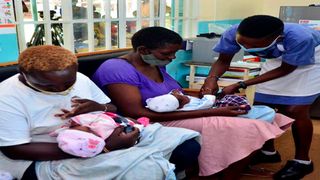
Nurse Winnie Akoth (right) immunizes children brought by their mothers at Yala Sub-County Hospital in Siaya County. The readiness of health facilities and workers to deliver appropriate pre-referral care to children with complicated malaria is inadequate.
| Francis Nderitu | Nation Media GroupHealthy Nation
Premium
Kemri: Kenya’s malaria pre-referral treatment is inadequate
A nationwide survey by researchers at the Kenya Medical Research Institute (Kemri-Wellcome Trust) has found that the readiness of health facilities and workers to deliver appropriate pre-referral care to children with complicated malaria is inadequate.
A decade ago, in 2012, Kenya revised malaria treatment guidelines to recommend the use of parenteral artesunate for pre-referral severe malaria treatment.
The Ministry of Health (MoH) went ahead to revise the guidelines yet again in 2016 to reflect recommended pre-referral treatment of suspected severe malaria at primary health facilities where intravenous severe malaria treatment is not possible.
The injections available included a single dose of intramuscular artesunate 2.4 mg/kg for adults and 3mg/kg for children less than 20kg before referral to a higher-level facility.
Severe malaria is a medical emergency requiring prompt supportive and intravenous treatment, which is usually available in inpatient settings.
The team of six researchers interviewed 1,540 health workers from 1,355 health facilities.
They conducted nine national surveys of randomly selected primary public health facilities undertaken bi-annually between 2017 and 2021, analysing the availability of pre-referral antimalarial drugs and knowledge of recommended pre-referral treatment for severe malaria.
The scientists established that injectable artesunate was available at 46 per cent, injectable quinine at 7 per cent, and artemether at three percent of the health facilities, while none of the facilities had rectal artesunate suppositories in stock.
“A total of 960 (62 per cent) health workers were trained on the use of injectable artesunate. (Some) 73 per cent of the health workers who had ever referred a child with severe malaria were aware that artesunate was the recommended treatment, 49 per cent said that an intramuscular injection was the preferred route of administration, and 60 per cent stated the correct dose.
The overall knowledge level of the treatment policy was low at 21 per cent and only slightly higher among trained than untrained health workers (24 per cent versus 14 per cent).
In an exclusive interview with the Nation on Sunday, Dr Beatrice Amboko, the lead investigative researcher, explained that in Kenya’s setting, a majority of sick children often visit primary health facilities (health centres and dispensaries) that often lack the capacity to provide intravenous severe malaria treatment.
“In such settings, it is recommended that they receive pre-referral treatment using a single dose of intramuscular (IM) artesunate 2.4mg/kg for adults and 3.0mg/kg for children less than 20kg before referral to a higher-level facility,” she said.
“If artesunate is not available, the use of artemether 3.2mg/kg or quinine 20mg/kg is recommended. In settings where intramuscular injections are unavailable or not possible, children below the age of six should be treated with a single dose of rectal artesunate suppositories and be referred immediately to an appropriate facility for further care.”
Dr Amboko said the findings revealed the inadequacy of primary public health facilities to deliver appropriate pre-referral care to children with severe malaria between 2017 and 2021.
The researchers asked the government to invest more in pre-referral antimalarials.
“There is a need to ensure the availability of nationally recommended pre-referral antimalarials, appropriate training and supervision of health workers in their administration of the treatments and monitoring of the entire referral process,” Dr Amboko said.
She said that the researchers did not analyse the data by regions.
“We did not analyze the data by regions as severe malaria is still a major public health problem across all regions in Kenya and all facilities need to be ready to provide the recommended pre-referral care for severe malaria,” she said.
She added: “To effectively control malaria, we need to use the vaccine together with other malaria control measures that include appropriate case-management.”





